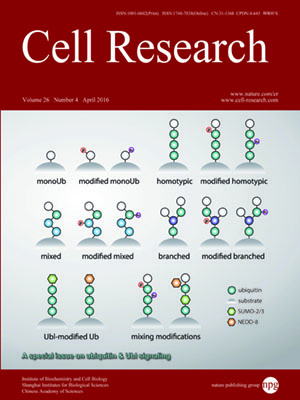
Volume 26, No 4, Apr 2016
ISSN: 1001-0602
EISSN: 1748-7838 2018
impact factor 17.848*
(Clarivate Analytics, 2019)
Volume 26 Issue 4, April 2016: 457-483 | Open Access
REVIEWS
Ubiquitin signaling in immune responses
Hongbo Hu1 and Shao-Cong Sun2,3
1Department of Rheumatology and Immunology, State Key Laboratory of Biotherapy & Collaborative Innovation Center for Biotherapy, West China Hospital, Sichuan University, Chengdu 610041, China
2Department of Immunology, The University of Texas MD Anderson Cancer Center, 7455 Fannin Street, Unit 902, Houston, TX 77030, USA
3The University of Texas Graduate School of Biomedical Sciences, Houston, TX 77030, USA
Correspondence: Shao-Cong Sun, Tel: +1-713-563-3218(ssun@mdanderson.org)
Ubiquitination has emerged as a crucial mechanism that regulates signal transduction in diverse biological processes, including different aspects of immune functions. Ubiquitination regulates pattern-recognition receptor signaling that mediates both innate immune responses and dendritic cell maturation required for initiation of adaptive immune responses. Ubiquitination also regulates the development, activation, and differentiation of T cells, thereby maintaining efficient adaptive immune responses to pathogens and immunological tolerance to self-tissues. Like phosphorylation, ubiquitination is a reversible reaction tightly controlled by the opposing actions of ubiquitin ligases and deubiquitinases. Deregulated ubiquitination events are associated with immunological disorders, including autoimmune and inflammatory diseases.
10.1038/cr.2016.40
FULL TEXT | PDF
Browse 2056


